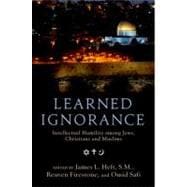
Note: Supplemental materials are not guaranteed with Rental or Used book purchases.
Purchase Benefits
What is included with this book?
| Contributors | p. ix |
| Learned Ignorance | p. 1 |
| Learned Ignorance and Interreligious Dialogue | |
| Some Requisites for Interfaith Dialogue | p. 23 |
| Learned Ignorance and Faithful Interpretation of the Qur'an in Nicholas of Cusa (1401-1464) | p. 34 |
| "Seeing the Sounds": Intellectual Humility and the Process of Dialogue | p. 53 |
| Finding Common Ground: "Mutual Knowing," Moderation, and the Fostering of Religious Pluralism | p. 67 |
| Must Particularity Be Exclusive? | |
| Humble Infallibility | p. 89 |
| Chosenness and the Exclusivity of Truth | p. 107 |
| The Belief in the Incarnation of God: Source of Religious Humility or Cause of Theological Pride? | p. 129 |
| Supernatural Israel: Obstacles to Theological Humility in Jewish Tradition | p. 149 |
| Walking on Divine Edge: Reading Notions of Arrogance and Humility in the Qur'an | p. 170 |
| Violence, Apologies, and Conflict | |
| After Augustine: Humility and the Search for God in Historical Memory | p. 191 |
| Apology, Regret, and Intellectual Humility: An Interreligious Consideration | p. 210 |
| Islamic Theological Perspectives on Intellectual Humility and the Conditioning of Interfaith Dialogue | p. 225 |
| Religious Pluralism | |
| A Meditation on Intellectual Humility, or on a Fusion of Epistemic Ignorance and Covenantal Certainty | p. 241 |
| Saving Dominus Iesus | p. 257 |
| Between Tradition and Reform: Between Premodern Sufism and the Iranian Reform Movement | p. 278 |
| Epilogue: The Purpose of Interreligious Dialogue | p. 300 |
| Index | p. 313 |
| Table of Contents provided by Ingram. All Rights Reserved. |
The New copy of this book will include any supplemental materials advertised. Please check the title of the book to determine if it should include any access cards, study guides, lab manuals, CDs, etc.
The Used, Rental and eBook copies of this book are not guaranteed to include any supplemental materials. Typically, only the book itself is included. This is true even if the title states it includes any access cards, study guides, lab manuals, CDs, etc.